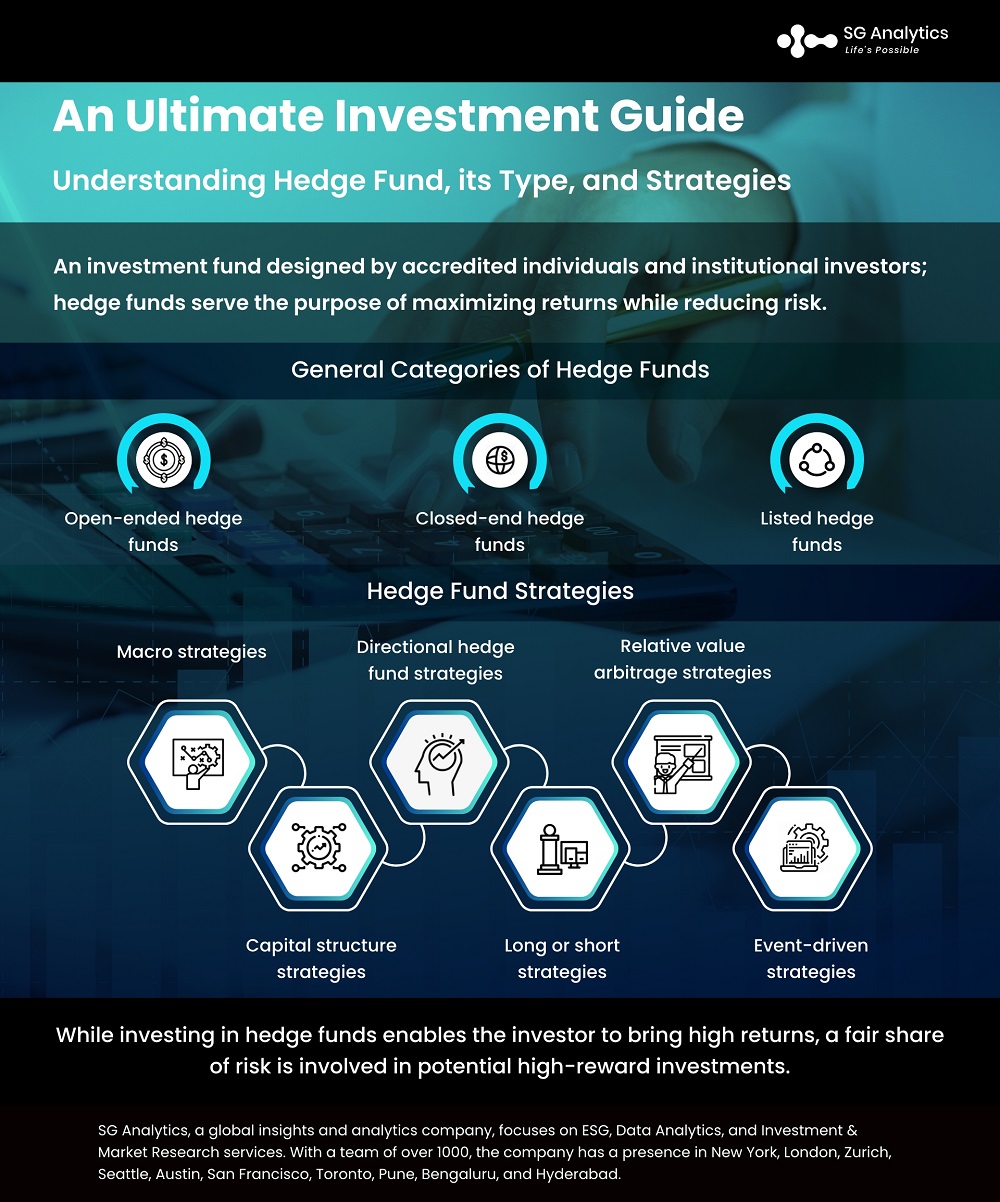When exploring new investment opportunities, the options can often be overwhelming. And the returns on such investments are not always what an investor expects. But if you are an inventory that has been lucky with investments and is looking to take a risk, you should check out a more exclusive and strategic investment option, like a hedge fund. And no hedge funds are not even close to a piggy bank full of change. Hedge fund investors usually rely on investment portfolio management software to track as well as manage their investment portfolios.
Hedge Funds: What is it?
A hedge fund involves a limited partnership of private investors where professional fund managers manage the invested amount. They employ a wide range of strategies, like leveraging or trading non-traditional assets, in order to gain an above-average return. A hedge fund focuses majorly on a cyclical sector, such as travel. A portion of the investment involves an investment of its assets in a non-cyclical sector, like energy. The aim is to use the returns of the non-cyclical stocks and offset any losses in cyclical stocks. Investments are considered a risky alternative investment choice and require a high minimum investment or net worth.
An investment fund designed by accredited individuals and institutional investors, hedge funds serve the purpose of maximizing returns while reducing or eliminating risk, despite the market climb or decline. It is a private investment partnership established by a fund manager as well as the fund investors. They are often structured as a limited partnership or limited liability.

Read more: Investment Banking: A Guide to Understanding the Role of Investment Bankers
General Categories of Hedge Funds
-
Open-ended hedge funds: These are issued to investors and enable the periodic withdrawals of the net asset value for each share.
-
Closed-end hedge funds: These funds are issued to a limited number of shares via an initial offering. However, no new shares can be further issued even if the investor demands an increase.
-
Listed hedge funds: These funds are traded on stock exchanges, and only non-accredited investors can purchase these shares.
Types of Hedge Funds
Hedge funds are considered evaluative and selective investment options that help an investor in generating maximum profits. Let us explore the four common kinds of hedge funds that investors often explore.
-
Global macro hedge funds leverage macroeconomic factors along with financial conditions such as real exchange rates and inflation rates, enabling investors to generate profit from market swings.
-
Equity hedge funds are funds that deal with or are invested in global or domestic stocks and offer protection against equity market downturns.
-
Relative value hedge funds enable the investor to generate better returns by leveraging the price differences of related securities.
-
Activist hedge funds are funds with investments in companies that act across different demands such as cost-cutting, changes on the board of directors, or even asset restructuring.
Hedge Fund Strategies
Some of the significant hedge fund strategies are as follows:
-
Macro strategies
In today's global macro strategy, managers are making bets based on emerging macroeconomic trends like interest rates, currencies, demographic shifts, or even economic cycles. Fund managers are employing discretionary and systematic approaches across major financial and non-financial markets to trade currencies, options contracts, and traditional equities.
Read more: Debt Ceiling Standoff - Will the World’s Renowned Economic Safe Haven go into Default?
-
Directional hedge fund strategies
In the directional approach, investment managers bet on the directional moves of the market. And many expect the trend to continue or reverse for a while. A manager analyzes market movements along with the inconsistencies to decide on the investment option for long or short equity hedge funds.

-
Relative Value Arbitrage Strategies
Relative value arbitrage hedge fund strategies take benefit from relative price discrepancies between diverse securities. The difference in prices is based on the diverge or converge market time. Sub-strategies in the category often involve fixed-income arbitrage, equity market neutral positions, or volatility arbitrage.
-
Capital Structure Strategies
Certain hedge fund strategies take advantage of the mispricing of securities in the capital structures of a single company. If the investment manager believes that the debt is overvalued, then they short on the debt and go long for the equity, thereby creating a hedge and betting on the eventual spread.
-
Long or Short Hedge Fund Strategies
In long/short strategies, the investment managers make pair trades to bet on two securities within a similar industry. If the manager expects that one company is expected to perform better than another, they will opt for a long investment in one and a short one in another.
-
Event-driven Strategies
Event-driven hedge fund strategies are used when there are underlying opportunities or risks associated with an event. Fund managers search for investment opportunities in corporate transactions like acquisitions, consolidations, liquidations, and bankruptcy. These transactional events usually form the basis of hedge fund investments in distressed securities, along with risk arbitrage and special situations.
Read more: FTX Fallout Calls for ‘Reset’ of Crypto Industry

Distinct Features of a Hedge Fund
Some of the noteworthy features of a hedge fund to note are as follows:
-
Hedge funds are open to only qualified or accredited investors. They cannot be offered or sold to the public. There is also a mandatory net worth requirement to be met by potential investors.
-
The fund exists as extensive investments across different sectors, like land, stocks, currencies, and commodities.
-
The funds use borrowed money to create leverage as well as to multiply returns.
-
Hedge funds come with management and performance fees.
-
When investing in hedge funds, investors must maintain their money for at least one year. Withdrawals of funds happen only at specific times, like quarterly or semi-annually.
-
The funds employ different investment strategies that are disclosed up front to the investors.
Investing in Hedge Funds: Pros and Cons
Investing in hedge funds can enable the investor to bring high returns. However, there is a fair share of risk involved in potential high-reward investments.
Investing in Hedge Funds: Pros
-
The use of different investment strategies provides the investor with the ability to generate positive returns irrespective of the current market conditions, favorable or unfavorable.
-
A balanced portfolio hedge fund can help decrease the risk and volatility and facilitate multiple returns on investment.
-
Hedge fund investments offer investors the ability to customize investment strategies precisely.

Investing in Hedge Funds: Cons
-
A wrong strategy can expose the hedge fund to huge potential losses.
-
Investors must lock in their investment/money for years.
-
The use of borrowed money can turn a minimal loss into a major loss.
Read more: Forecast: Top Venture Capital Market Trends In 2023
Key Highlights
-
Hedge funds are considered managed alternative investments, most defined as risky investment strategies.
-
Hedge fund investment mandates a high minimum investment or a net worth from accredited investors.
-
The charge fees for hedge funds are more when compared with conventional investment funds.
-
Common hedge fund strategies mostly rely on the fund manager and/or include equity, fixed-income, as well as event-driven goals.

Final Thoughts
Hedge funds can be considered a complicated form of investment along with a risky alternative investment choice mandated by a high minimum investment or net worth. With the distinctive characteristics, strategies, and tax regulations, gaining an in-depth understanding of hedge funds can be a troublesome task. However, if you are looking to make an investment and fit the requirement list of the people that can invest, hedge funds can be a major source of income.
With a presence in New York, San Francisco, Austin, Seattle, Toronto, London, Zurich, Pune, Bengaluru, and Hyderabad, SG Analytics, a pioneer in Research and Analytics, offers tailor-made services to enterprises worldwide.
A leader in Hedge Fund Research Services, SG Analytics helps in alpha generation by providing actionable research to money managers, active asset managers, and mutual fund managers. Contact us today if you are in search of an investment research firm that offers tailored research support across asset classes to enhance the quality and efficacy of your investment.










